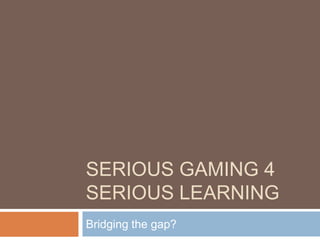
Serious Gaming for Learning: Bridging the Gap Between Digital Immigrants and Natives
- 1. SERIOUS GAMING 4 SERIOUS LEARNING Bridging the gap?
- 2. What bridges? Digital immigrants Digital Natives (Prensky 2001) Teaching styles Learning styles (Becker Formal learning 2006) Surface Learning Informal learning Extrinsic motivation Deep learning Direct instruction Intrinsic motivation Linear modes Inductive teaching style Inclusive, collaborative modes No single theory, different ways of learning & teaching
- 3. In a nutshell (Jonnassen, Wilson & grabinger, 1993) Behaviourist game design Constructivist game design No extraneous information Natural complexity and content of language Simplifies comprehensibility Avoids oversimplification Reconstructs/replicates knowledge Present multiple representation / Abstracts instruction perspectives experience Real world contexts Focuses on acquiring skills Engages reflective Prescriptive sequences of practice instruction Offer open learning Supports individual learning environments
- 4. The situated perspective tenets Knowledge not an object, memory not a location Social interaction and negotiation in new situations Learning happens in authentic contexts Bridges the artificiality of classroom learning to real-life situations Knowledge construction through participation In given communities with specific Culture, Language (jargon included) & Tools
- 5. MUVEs & MMORPGS Multi-User Virtual Environments Massive Multi-user Online Role Play Games Add the 3d Component (≠ 2D – cards, chess) Users evolve through an avatar (presence) Interact with the environment & often with other MUVEs avatars MMORPGs Freedom Objectives, rules and rewards Social (Special Interest Groups = Competitive (individual, teams, guilds) SIGs) Creative Creative Communities of Practice
- 6. Some MMORPGs used in Edu MinecraftEdu widely used in primary, secondary SecondLife soft and hard sciences WoW Both Secondary & Higher Ed Atlantis Remixed 9-16 y-o Civilization V
- 7. Gee’s Affordances (foreword in Reinders 2012) A good game design include: Well-ordered problems Tools (and other players) to solve problems Learning by negotiating, building, sharing, Copious feedback to prepare for next stages, higher level Next stages have new challenges (ZPD – cycle of expertise) Playing & Learning through social interaction and mentoring Two way narratives Reach standards in different ways Easy design so gamers can become designers (See Jonassen 1994)
- 8. Challenges for educators Opportunity or disruption? – mechanics of gameplay Learning to play versus learning language Requirements (hardware and human resources, time) Institutional buy-in Curriculum Integration (alignment goals- assessment) feedback, on-going assessment, formative vs summative Needs more research & practice, check livebinders See Stephen Thorne’s IATEFL 2012 Keynote Read this post of teacher of German using WoW
- 9. Further Readings: Becker, K., (2006) Games and Learning Styles, Academia.Edu [online] Brown, J.S., Collins, A. & Duguid, S. (1989). Situated cognition and the culture of learning. Educational Researcher, 18(1), 32-42. Jonassen, D.H., Wilson, B.G., Wang, S., & Grabinger, R.S. (1993). Constructivist uses of expert systems to support learning. Journal of Computer- Based Instruction, 20(3), 86-94. Kkorthagen F.A.J., (2010) Situate Learning Theory and the Pedagogy of Teacher Education: Towards an integrative View of Teacher Behaviour and Teacher Learning. Teaching and Teacher Education, 26 (pp98-106) [online] Lave, J., & Wenger, E., (1990). Situated Learning: Legitimate Peripheral Participation. Cambridge, UK: Cambridge University Press Prensky M.,(2001) Digital Natives, Digital Immigrants. On the Horizon, MCB University Press, Vol. 9 No. 5, October 2001 Reeve J. K. (2010) . Constructivism and Its Application to Game-Based Learning [online] Reinders, H. (2012) Digital Games in Language Learning and Teaching, New Language Learning & Teaching Environments. Basingtoke, England: Palgrave MacMillan Young, F. Y. (1993). Instructional Design for Situated Learning. Educational Technology Research and Development, 41 (1), 43-57.
- 10. Second Life Platform 3d MUVE, not a game Role Play is more than half of users’ activities Artists also promote their work Learning Higher Ed for simulation Language learning - CoPs & Slanguages symposium Edunation, Virtlantis, Cypris Chat, Instituto español, etc Simulation, explorations and treasure hunts French FL and VUW language program
- 11. VUW languages – Aims of project
- 13. Various Activities – levels of competence Explorations, interviews, treasure hunts, Set lessons directed by the course outline
- 15. Recommendations
- 16. Questions ? Edith.paillat@vuw.ac.nz
